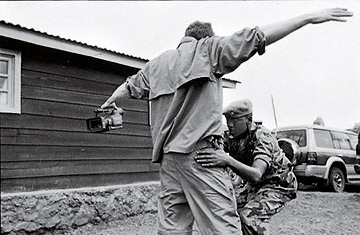
Affleck is patted down before he interviews Laurent Nkunda.
(2 of 2)
For its part, the FDLR has been present in eastern Congo for more than 14 years. Its members have committed many massacres of Tutsi civilians and have exploited the rich mineral resources of the region. The FDLR subjugates people either by rape (often performed in groups--and on people of either gender) or with the AK-47, a weapon so ubiquitous that it has picked up a tragic moniker: the Congolese credit card. Mary, the scarred woman in the center of the photo collage on the next two pages, told me that FDLR men raped her, set her house on fire and left her to die. She survived. Her 2-year-old daughter did not.
In interviews with Congolese civilians living under FDLR control, I consistently heard one thing: they wanted the génocidaires out. But many believe the only lasting solution will be a military one--and no Western nation has shown much interest in shipping troops to central Africa.
It is Africans themselves who are finding a way forward.
There have long been accusations that Nkunda was sponsored and supported by President Paul Kagame of Rwanda. But last month something happened that seems to have ended that debate. Congo and Rwanda joined forces. Kagame's troops flushed out and arrested Nkunda, then helped facilitate a cease-fire with his forces in the National Congress for the Defense of the People (CNDP). Kabila's government in Kinshasa made a deal to protect the new CNDP leader, Bosco Ntaganda (who is wanted for war crimes), and joined Rwandan forces in fighting the FDLR. Their joint effort has been under way for several weeks, and to date, there have been no civilian deaths as a result.
Remarkable things are happening in eastern Congo. The Congolese army and the CNDP are working together to separate Hutu civilians from Interahamwe commanders, and already hundreds have been freed. According to one expert on the region: "For the first time, Rwandan and Congolese, Tutsi and Hutu are working together to begin the long road of ethnic reconciliation."
Hard choices remain. Will Nkunda, for example, be extradited from Rwanda? Kabila has promised that Rwandan troops will be out of Congo by March, but every day that they stay--and the thrill of Nkunda's capture recedes--it becomes more difficult politically for him to sustain his bold initiative. None of this will be easy.
But after innumerable failed, internationally brokered peace efforts, a quietly engineered, bilateral African solution has broken a stalemate. Now there is at least a chance of something better for eastern Congo. Says Kagame, who has lived through civil war, genocide and two wars in Congo: "I have never been more hopeful than right now."
